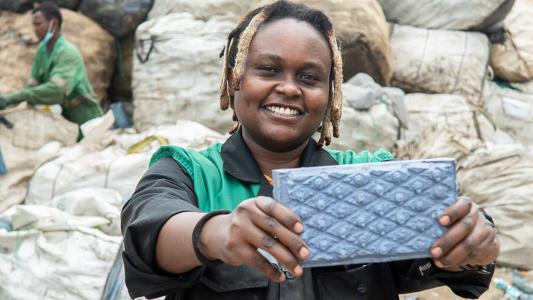Recycling old clothing is a challenge because the resulting product has little use.
The EPA estimates that in 2018 the U.S. generated 13 million tons of clothing and footwear. Eventually (hopefully after reuse and recycling), much of our old clothing ends up in the trash.
Most textiles that end up in municipal solid waste are clothing, and recycling cotton fiber isn’t easy. But maybe we should forget about recycled cotton — a team of researchers at Lund University in Sweden have created a method for transforming cotton — into sugar.
No, this won’t be a new source of food. The sugar won’t be edible or drinkable, because it will have been contaminated with sulfuric acid. But it can be transformed yet again into spandex, nylon, or ethanol (an industrial chemical used to synthesize other chemicals).
To recycle clothing the old-fashioned way, it has to be transformed back into raw material before it can be revamped into a new pair of jeans. The first step is to chop it up — a process that degrades the material’s quality because it shortens the fiber length.
Some companies, like Levi, H&M, or The North Face, will recycle old garments. But Levi, for example, can only use up to 20% recycled cotton in a new pair of jeans. Any more than that and the “distressed” look will take on a new meaning — it just doesn’t measure up to quality standards, reports Quartz.
While some recycled cotton fibers are still usable, recycle the material repeatedly and, eventually, the recycled cotton fibers are too short for fiber regeneration.
“Considering that cotton is a renewable resource, this is not particularly energy-efficient,” says Edvin Ruuth, a chemical engineer at Lund University.
Cotton has a complex structure, so Ruuth’s team worked for a year to concoct the perfect recipe that would break down the cellulose into simpler sugars. Early versions only transformed a measly 4% of the cotton into sugar.
“(I)t is a very delicate process to find the right concentration of acid, the right number of treatment stages and temperature.”
Now, Ruuth can convert 90% of the cotton into sugar using the ideal combination of heat and sulfuric acid.
“What makes cotton unique is that its cellulose has a high crystallinity. This makes it difficult to break down the chemicals and reuse their components. In addition, there are a lot of surface treatment substances, dyes and other pollutants which must be removed. And structurally, a terrycloth towel and an old pair of jeans are very different,” he says, not to mention fabric blends like my favorite cotton-spandex stretch jeans.
Transforming cotton in this way isn’t entirely new, Ruuth says — but doing it cost-effectively is. He says his method is simple and cheap. Just like creating recycled cotton — or most kinds of recycling — the biggest challenge will be finding an effective way to sort the textiles from the trash. But, once we master that, then your old sweatpants are on their way to becoming your new spandex leggings.
We’d love to hear from you! If you have a comment about this article or if you have a tip for a future Freethink story, please email us at tips@freethink.com.
